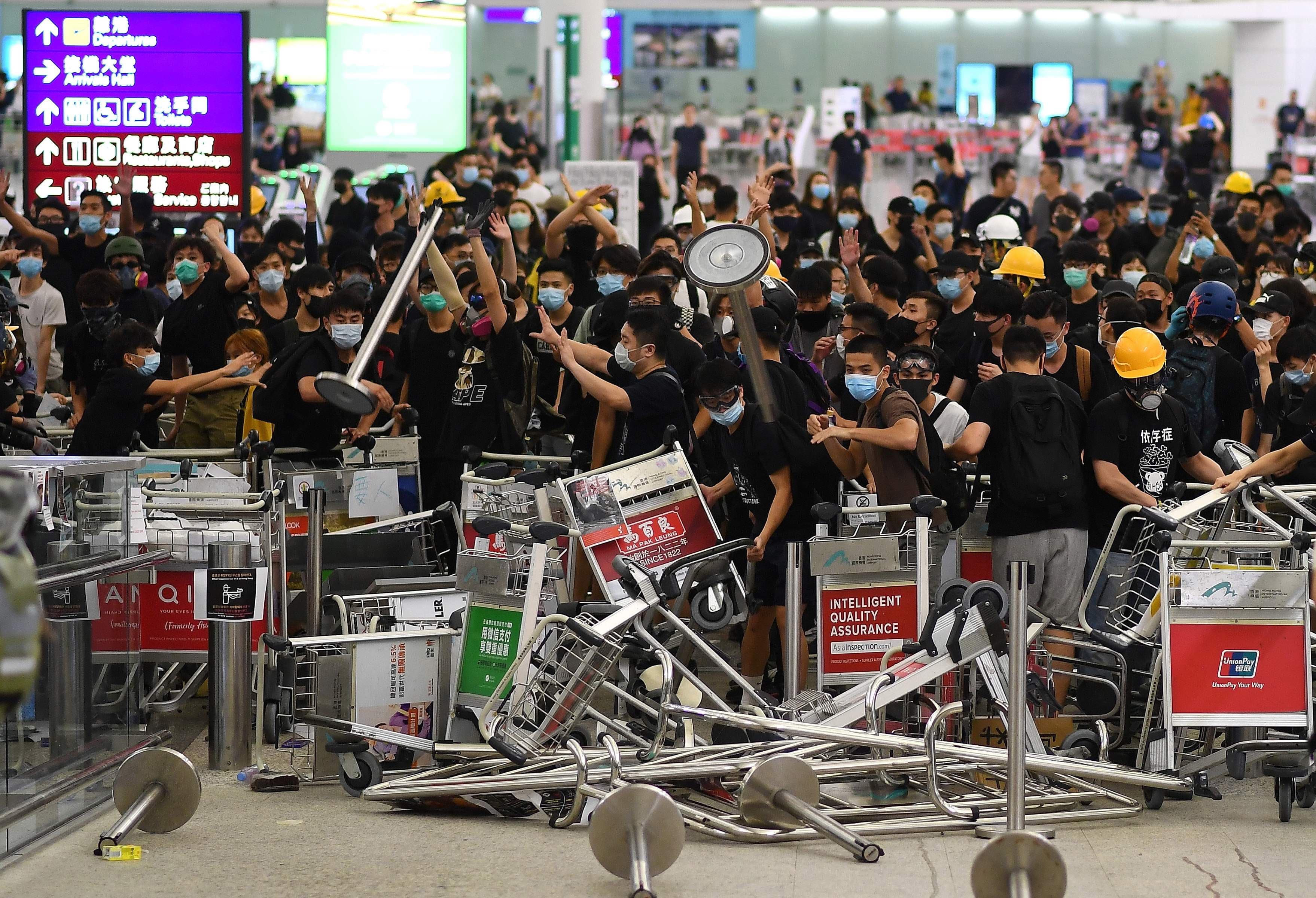US intelligence has confirmed that China is moving troops to the border with Hong Kong, US President Donald Trump said on Tuesday, appealing for calm amid intensifying pro-democracy protests in the semi-autonomous financial hub.
Trump relayed the intelligence report in a tweet as protesters paralysed Hong Kong airport for a second day in defiance of the city's leaders.
“Our Intelligence has informed us that the Chinese Government is moving troops to the Border with Hong Kong. Everyone should be calm and safe!” Trump said in a tweet.
Chinese state and social media had earlier aired video of security forces gathering across the border from the enclave, which has been rocked by unrest for ten weeks.
The Global Times and the People's Daily ran a minute-long video compiling clips of armored personnel carriers and troop carriers purportedly driving to Shenzhen, which borders Hong Kong.
The video shows roughly two dozen armored carriers apparently driving through the southern city of Guangzhou and other troop carriers leaving eastern Fujian province.
Hu Xijin, editor-in-chief of the state-run Global Times, said on social media that the military presence is a sign that if the situation in Hong Kong doesn't improve, China will intervene.
Speaking to reporters in Morristown, New Jersey, Trump called the situation in Hong Kong “very tricky.” “I hope it works out peacefully, nobody gets hurt, nobody gets killed,” he said.
Blockade, beating, pepper spray in airport chaos
Chaos erupted at Hong Kong's airport for a second day on Tuesday as pro-democracy protesters staged a disruptive sit-in that paralysed hundreds of flights, saw police fire pepper spray, and a mainland journalist beaten.
Demonstrators defied warnings from the city's leader who said they were heading down a “path of no return”.
The latest protest led to ugly scenes at one of the world's busiest airports where small groups of hardcore demonstrators turned on two men they accused of being spies or undercover police — and as desperate travellers pleaded in vain to be allowed onto flights.
Hong Kong's ten-week-long political crisis has seen millions of people take to the streets calling for a halt to sliding freedoms and was already the biggest challenge to Chinese rule of the semi-autonomous city since its 1997 handover from Britain.
All check-ins were cancelled on Tuesday afternoon after thousands of protesters wearing their signature black T-shirts made barricades using luggage trolleys to prevent passengers from passing through security gates.

Scuffles broke out between protesters and travellers who pleaded to be allowed past.
Vigilantism also broke out when crowds turned on two men suspected of being interlopers.
Police recently disguised themselves as activists to make arrests, a move which has sent paranoia soaring about potential infiltrators.
The first man was held for about two hours before eventually being led away in an ambulance. Riot police briefly deployed pepper spray and batons to beat back protesters while they escorted the vehicle away from the departures hall.
Soon afterwards a second man — wearing a yellow journalist vest — was surrounded, zip-tied and then beaten by a small group who accused him of being a spy.
In a tweet, the Global Times' editor — which has vociferously condemned the protests — confirmed the man was a journalist working for the paper.

The man was later driven away in an ambulance after fellow protesters and volunteer medics carried him away.
'Into an abyss'
On Tuesday morning, the city's leader, Carrie Lam, gave an at-times emotional press conference in which she warned of dangerous consequences if escalating violence was not curbed.
“Violence... will push Hong Kong down a path of no return,” she said.
Lam, who faced fierce questioning from local reporters and at one point appeared to be on the verge of tears, appealed for calm.
“Take a minute to think, look at our city, our home, do you all really want to see it pushed into an abyss?” Lam said, although she again refused to make any concessions to the protesters.
Hong Kong's Hang Seng Index fell 2.10 per cent in its third straight day of losses.
The airport became a target on Monday and Tuesday after especially fierce clashes between police and protesters over the weekend in which a woman suffered a severe injury to her right eye.
Protesters blamed the injury on a police bean-bag round and used social media to gather their numbers at the arrival and departure halls, with hundreds of flights cancelled in the pandemonium.
Some travellers voiced sympathy with the protesters.
“I understand the basics of the protest and they've got a point: it's about freedom and democracy and it's incredibly important,” said Pete Knox, a 65-year-old Briton on his way to Vietnam.
Others were conflicted.
“I do really feel for the protesters here, I really do. But I can't quite reconcile with myself whether this is the right way of doing it,” said Chun-sun Chan, 46, who was trying to fly home to his two children in Britain.
'Mobsters'
The protests began in opposition to a bill that would have allowed extraditions to the mainland, but quickly evolved into a broader battle to reverse a slide of rights and freedoms in the southern Chinese city.
Authorities in Beijing on Monday slammed violent protesters who threw petrol bombs at police officers, linking them to “terrorism”.
On Tuesday state media upped the ante, calling protesters “mobsters”, warning they must never be appeased and raising the spectre of mainland security forces intervening.













































